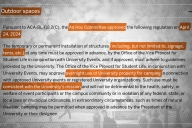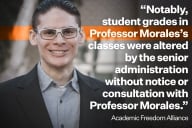You have /5 articles left.
Sign up for a free account or log in.
In a major new effort to assure rigor and relevance for college degrees at various levels, three states are today formally launching a project aimed at “tuning” academic programs in six fields of study.
“Tuning,” borrowed from Europe’s Bologna Process, involves research and surveys of faculty members, students and employers, and consultation with business and government leaders, to determine exactly what a degree in a given field stands for in terms of students’ learning and competencies. Europe embarked on tuning as part of an effort to make degrees across the continent interchangeable, so that a bachelor’s degree in chemistry in Italy would mean roughly the same as one in the Netherlands, and that graduate programs and employers could thus know what a given degree would represent.
In the United States, the three states starting such efforts today are Indiana (in education, history and chemistry), Utah (in history and physics), and Minnesota (in graphic design and chemistry). The effort is being led by the Lumina Foundation for Education.
A general theme of the effort is that degrees will have more meaning if there is a consensus about what they mean, and if that consensus is based on learning objectives and skills, not credits earned or courses completed.
Clifford Adelman, one of the leading American experts on the Bologna Process and the enrollment patterns of American students, is working with Lumina and the state teams on the tuning project. In a statement, Adelman said it was important to shift the way American colleges define degrees.
“When U.S. colleges and universities describe what students must do to earn a degree in a specific field, they list courses, credit requirements and a minimum grade-point average,” Adelman said. “They do not typically state what students with the degree should know and be able to do in ways that employers, policy makers and the public can immediately understand. We need to embrace a more comprehensive approach to defining the learning that degrees represent or risk falling further behind our global counterparts.”
A document from Lumina outlining the advantages of tuning states that the “process makes the value of any degree more clearly visible and more directly comparable by and among students, academics and employers. It also highlights -- in real-world terms -- the institution’s contribution to the value of that degree. It serves as a starting point for shared definitions of quality and excellence. And it does this without limiting the flexibility and diversity of the individual institutions.”
State study groups -- which will include faculty members and students -- will focus on the disciplines selected by the states to determine appropriate learning outcomes and competencies. The goal is to relate these goals directly to the employability of graduates.
In making the announcement, Lumina stressed the desirability of having common expectations for programs, but also emphasized that individual colleges would still control their own offerings.
“While the phrasing of these outcome statements can vary among institutions, all must observe the agreed-upon reference points and templates. For each learning outcome, faculty in the discipline can then establish performance criteria, or definitions of what a student must demonstrate to attain that outcome,” the Lumina document states.
“Each school or department in the discipline designs its own curricular program, delivery methods and assessments to help students attain the agreed-upon learning outcomes. The reference points and templates are arrived at in broad consultation through surveys and field testing with faculty members, students, employers, previous graduates, and faculty in other disciplines from the same institution. The product of the Tuning process in each discipline is a public statement of learning outcomes and criteria of attainment.”
The European process of tuning had the challenge of crossing national boundaries. But the references in the Lumina announcement to colleges’ ability to construct their own programs reflect what may be a challenge in the United States. While the norm for European higher education is the large state university or the state polytechnic system, American higher education prides itself -- to a degree unusual compared to most other countries -- in the diversity of institutions.
Private liberal arts colleges, for example, exist all over the country, with their own values and curriculums. There is also enormous variation among state flagships, with some states embracing the model of elite research university with highly competitive admissions, and other states favoring more populist approaches.
In an effort to encourage the development of competencies and learning objectives that could apply to different kinds of colleges, the project has recruited state teams that include a range of institutions. So Minnesota’s team, for example, includes the flagship University of Minnesota; an elite private liberal arts college, Carleton College; and numerous state colleges and community colleges: Alexandria State College, Bemidji State University, Minnesota State University at Moorhead, North Hennepin Community College, and South Central College.
In Europe, the tuning process is ongoing, but has made considerable progress, and agreements have been reached on 9 subject areas at 137 universities in 16 countries.
Some of the competencies identified for chemistry, for example, are general, such as “ability to apply chemistry knowledge and understanding to the solution of qualitative and quantitative problems of an unfamiliar nature" or “interpersonal skills, relating to the ability to interact with other people and to engage in team-working.” Other competencies identified are more specific, such as knowledge of “major synthetic pathways in organic chemistry, involving functional group interconversions and carbon-carbon and carbon-heteroatom bond information” and “the nature and behavior of functional groups in organic molecules."
History competencies identified include “ability to comment, annotate or edit texts and documents correctly according to the critical canons of the discipline,” “ability to communicate orally in foreign languages using the terminology and techniques accepted in the historiographical profession” and “ability to identify and utilize appropriately sources of information (bibliography, documents, oral testimony etc.) for research project.”
Asked about future plans for tuning, a Lumina spokesman said that no expansion would be considered until after this first test, and that there is a desire for the process to grow “in an organic fashion."
While Lumina has stressed the faculty role in developing the various frameworks to be used in the system, there may be skepticism from some professors. Cary Nelson, president of the American Association of University Professors, said that while tuning plans claim to promote "accountability and comparability of outcomes without standardization, it is actually very difficult to do so without compromising academic freedom."
He noted that some parts of what professors do in the classroom will appeal to those involved in the tuning process, while other, vital parts of the classroom may receive little interest from those doing the tuning, creating pressure to shift away from those areas. "My own instructional aims encompass teaching mastery of subject matter, promoting students' capacities as critical intellectuals, and instilling good writing practices," he said. "These goals are integrally related; to separate the elements most susceptible to the tuning process eviscerates the whole."







